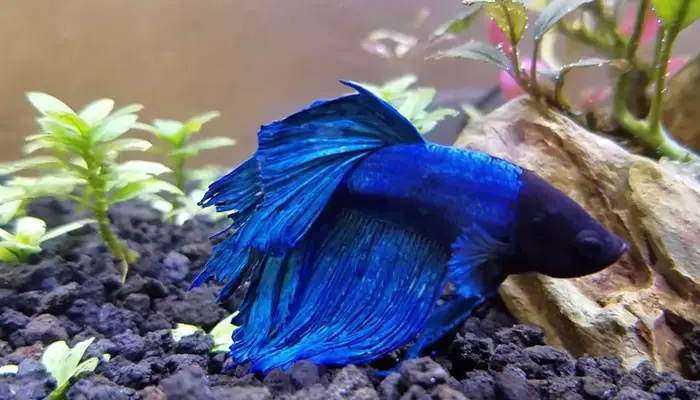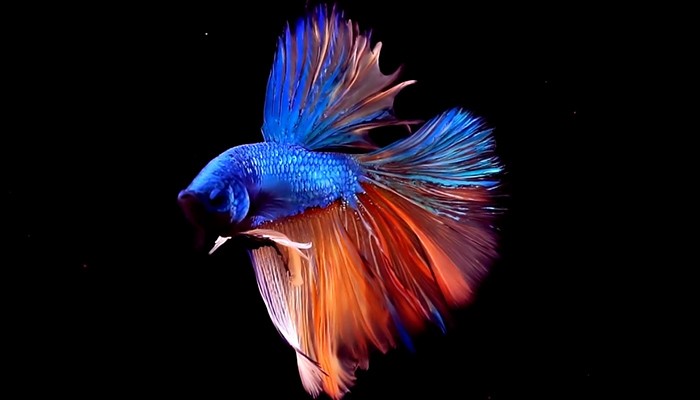5 Causes Behind Black Spots On Betta Fins [Treatment]
Many people raise different kinds of aquatic pets. The betta fish is one of them. Begin with, the betta fish, widely known as the Siamese fighting fish, come from Indonesia, Thailand, Myanmar, and many other Southeast Asian countries.
The betta fish is popular mostly because of their colorful and exotic fins. So, certainly, it is a big issue if they get some unnatural symptoms such as black spots on their fins.
Most importantly, what are the reasons behind the black spots on betta fins, and how to fix them?
In most cases, betta fishes get black spots on their fins because of two kinds of diseases: velvet parasite and black spot disease or tang disease. Other causes can be mental stress and water quality. Besides, a betta fish may get black spots on fins because of aging.
This article will discuss the 5 reasons why a betta fish has black spots on its fins and their solutions. In addition, we will tell you the symptoms of black spot disease and the necessary arrangements for prevention as a bonus.
So, let’s get started.
Why Does the Betta Fish Have Black Spots On His Fins?

1. Natural Phenomenon
Betta fishes typically get black spots on their body as they grow old. Moreover, it starts from the betta fins. So, black spots on betta fish’s fins aging are natural and normal.
2. Velvet Disease
Velvet disease is commonly known as gold dust disease. Usually, a betta fish gets dust-like golden spots on its fins and other parts of the body as an early symptom of the disease. However, you may also find some black spots on the fins as a sign of this disease.
Usually, a small kind of parasite causes this velvet disease. Although it is mostly found in saltwater, it can often attack your freshwater tank. Firstly, it attacks the betta fish’s slime coat and then starts eating cells.
A type of algae named OÖdinium parasite causes this betta fish disease in freshwater. If you don’t clean the aquarium properly, this algae can easily attack your fish.
Some Common Symptoms
Your betta fish will show certain symptoms if the velvet parasite attacks it. So, here are the details of the syndrome-
- Firstly, your betta fish starts losing its charming color.
- It gets golden or yellow spots all over the body.
- As another early sign, it gets black spots on its fins.
- As the late sign, it faces trouble with breathing and becomes less active.
- The betta fish scratches its back against stones or other decorations.
- Finally, it loses its appetite and stops eating.
Effects
Although the velvet parasite is not fatal itself, it’s extremely contagious. To be more specific, it can spread from one fish to other aquatic pet or one aquarium to another.
Besides, this betta fish disease weakens the fish’s immune system and increases the possibility of other infections. Moreover, it also damages the fish’s skin.
Treatment
Let me be honest, the treatment for velvet parasites is effortless at the early stage. However, it is troublesome to treat the fish when it spreads all over the fish tank in the late stage. Besides, it also takes more time to get rid of the velvet parasite completely.
In the early stage, you only need to follow the three steps below-
- Change the water since it can wash out 60% of parasite algae.
- Raise the water temperature of the fish tank from 74 to 84 degrees Fahrenheit because the velvet parasite cannot survive in an environment of high temperature.
- The parasites need light. So, you can put your fish tank in a dark place to avoid the light so that they starve and finally die.
On the other hand, if you find out the velvet disease of betta fish at the final stage in the aquarium, then you need some serious action. To treat your betta fish, you can use-
- Aquarium Salt (our pick: API AQUARIUM SALT Freshwater Aquarium Salt)
- Betta Velvet Medicine (our pick: API MELAFIX Freshwater Fish Bacterial Infection Remedy)
- Copper Sulfate (our pick: Crystal Blue Copper Sulfate Algaecide)
The betta velvet medicine is the best choice to treat the betta fish since it can completely remove the velvet parasites. Although copper sulfate also works well, it is a long process since it takes 10-12 days to complete the treatment.
On the other hand, aquarium salt is a great product for post-treatment. It heals your pets after getting well from the velvet disease.
3. Black Spot Disease
Another obvious reason for black spots on betta fish fins is the black spot disease. As this disease is commonly found in the Tangs, its other name is the Tang disease.
If your betta fish gets affected by the black spot disease, you will see some little black spots on your pet’s fins. They are nothing but a kind of flatworm called Phylum Platyhelminthes.
Some Common Symptoms
A certain sign of the black spot disease is the tiny black spots on your betta fins. Besides, your betta fish also scratches against solid objects to get free from the worms (like the velvet-affected fishes). As a late sign, it can lose its appetite and skin color.
Effect
Since black spot worms can move freely, this disease is extremely contagious. As a result, it can affect all other aquatic animals in your fish tank. Otherwise, it is less fatal than many other parasite diseases.
Treatment
This black spot disease is easier to treat than many other diseases. But if your betta fish has already got the black spot disease, you need to make some necessary arrangements. Here’s how:
- Vacuum your aquarium with a gravel cleaner. It will lessen the number of worms from the substrate. (Our pick: Natural Rapport Aquarium Gravel Cleaner)
- Quarantine the affected fish somewhere else.
- Put the affected pets in a freshwater tank with a formalin solution.
- You can also use anti-worm medication such as Praziquantel in the quarantine tank to treat your betta fish.
4. Bad Water Condition
Water quality plays quite an important role in the fish tank environment. Especially, the pets’ health and overall well-being depend on the aquarium water condition.
The simple truth is- poor water conditions may create black spots on your betta fins. Some water conditions below are the cause of black spots-
- Irregular water change.
- Dirty fish tank.
- Unclean water.
- Fish tank water with high ammonia levels.
- Water with too high or too low a pH level.
- Excessive cold or high temperature in the water.
The unclean and unfriendly aquarium water is not good for your betta babies. It not only creates black spots on betta fins but also is the reason for so many diseases.
Solution
If your betta pets get black spots on their fins from the unclean water, then taking some straightforward steps will help you a lot. So, check this out:
- Firstly, change the unclean water with fresh RO water.
- Make sure that the water has a regular pH balance. To check the accurate pH balance, you can use the API pH Test kit (our pick: VIVOSUN Digital PH Meter for Water)
- Secondly, a vacuum cleans the aquarium substrate and other objects in the fish tank.
- Finally, provide sufficient oxygen in the fish tank water. Nowadays people use an airstone in the fish tank to provide enough oxygen and trust me, it is very handy. (Our pick: AQUANEAT 1 Inch Air Stone)
- You can add one to three tablespoons of aquarium salt to develop the water quality. However, it is not mandatory.
If you follow these steps, the black spots will gradually go away.
5. Stress
You may wonder- why my betta has black spots on his fins even though the fish tank is clean and there’s no sign of any disease.
Surprisingly, your betta pets may get black spots because of mental stress. Typically, the fish tank environment causes this stress.
An overcrowded fish tank is not suitable for the betta fish. The male bettas have the instinct to secure their territory. So, they can easily fight with other fish.
Over-stress is always harmful to the betta fishes. It causes discoloration and other health issues.
Solution
If you notice that your betta fishes get stressed out, then you can make some arrangements for them.
- Separate the stressed fish in the other tank with better water quality.
- You can keep the betta pets with fishes like Cory Catfish, Ember Tetras, Harlequin Rasboras, and Kuhli Loaches.
- Add some plants such as Dwarf Sagittaria or Amazon Swords which will help the bettas to release the stress.
- Consider twenty gallons of water for each betta.
How Do I Prevent Black Spots On Betta Fins?

You can prevent the causes of black spots on the betta fins. Prevention is way more easygoing than dealing with a problem that has already happened.
So, keep reading to know how to prevent it.
- Clean the fish tank at least once a week. It will prevent all the harmful algae and bacteria.
- Change the water and adjust the pH level regularly.
- Vacuum and clean the substrate regularly.
- Do not overcrowd your fish tank. It is very important for the betta fish.
- Put the betta pets into a larger aquarium.
- Feed the betta fishes properly and do not give them excessive food. It will save a lot of trouble.
Frequently Asked Questions
Why has my betta fish turned black and died?
Your betta fish may get black spots for some common diseases. However, it is not a good thing if your betta pet turns black. The common reason for this condition is ammonia. Since it works like poison, it may even cause the death of your favorite fish.
Why are my betta fish’s fins turning black?
A betta fish’s fins may turn black for different reasons. The common causes are- Fin rot disease,Black spot disease, Velvet parasite, Unclean water, Polluted tank, and Stress.
Conclusion
Getting black spots on the fins does not always necessarily mean that your betta fish is dying. However, preventing those black spots is always the smartest idea.
But first of all, you should know the reason for the black spots on betta fins. For example, your betta fish may get black spots on its fins because of any common type of disease (velvet, black spot disease) or poor water conditions.
In this way, you will know the accurate cause of the black spots and take necessary actions for that. We hope that this article will help you to understand the causes of black spots on your betta buddies and give you the right solutions.
- Convict Cichlid And Kissing Gourami – Your Ultimate Guide To A - December 12, 2025
- Blue Gourami Not Eating – Expert Solutions To Revive Your Fish’S - December 12, 2025
- Croaking Gourami Malaysia – The Expert’S Guide To Thriving Care & - December 12, 2025
